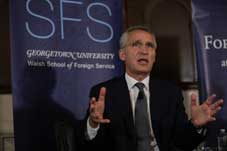
NATO Sec-Gen Talks about Russian Aggression and Its Influence on Georgia’s Path Towards NATO
By Khatia Bzhalava
Tuesday, October 12
“It is only for NATO members, Georgia and Ukraine to decide when they are ready to join the alliance, not Russia,” said NATO Secretary-General Jens Stoltenberg at an event hosted by Brookings Institution and Georgetown University in Washington, D.C. NATO Sec-Gen noted that the relationship between the North Atlantic Alliance and Russia is currently at the lowest point since the end of the Cold War.
According to him, NATO started to form a positive relationship with Russia after the Cold War by establishing the NATO-Russia Council. “We had, step by step strengthen our cooperation and political dialogue with Russia, and many of us were quite optimistic,” Stoltenberg noted, however, as NATO Sec-Gen notes, this gradually started to change, starting in 2008 when Russia went into Georgia and took control over parts of Georgian territory, followed by the illegal annexation of Crimea in 2014.
When asked if Georgia and Ukraine joining NATO would exacerbate relations with Russia, Stoltenberg stressed that “it is the right for any sovereign nation to decide its path.” According to him, the idea that Russia’s small neighbors joining NATO would be a “provocation” to Moscow is ‘absolutely wrong’ and the message that it was provocative for Russia that Latvia, Lithuania, Estonia, Slovakia, and the Czech Republic joined the NATO, exemplifies that Russia strives to have a world order where they control the neighbors. “That’s not the world I would like to live in, and actually I have fought for decades to move away from that world,” Stoltenberg noted.
Stoltenberg believes that more should be done to support aspirant countries in implementing reforms, fighting corruption, and building security and defense institutions.
“It is only for NATO members, Georgia and Ukraine to decide when they're ready to join. Not Russia. We support their efforts to modernize, to reform, to meet the NATO standards and when 30 Allies agree that they are ready to join, they will join. I cannot tell you when that will happen, but that's the only way that this can be dealt with,” said the NATO Secretary-General.


![“We support their [Georgia, Ukraine] efforts to modernize, to reform, to meet the NATO standards,” Stoltenberg stressed.](khatia2.jpg)